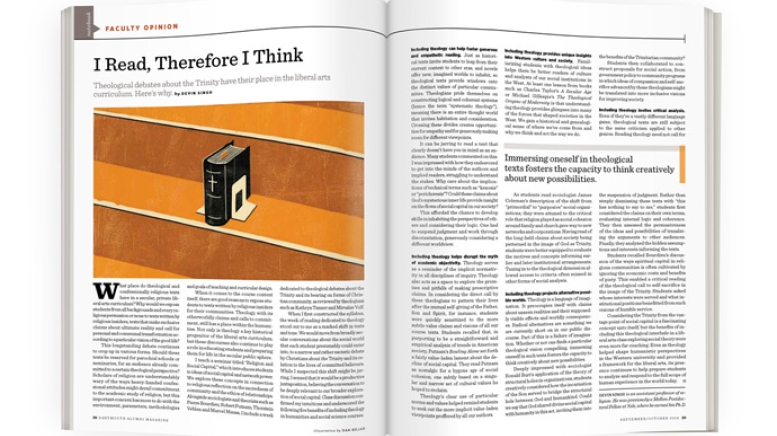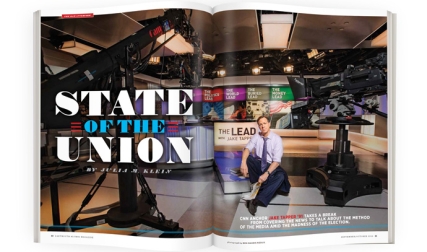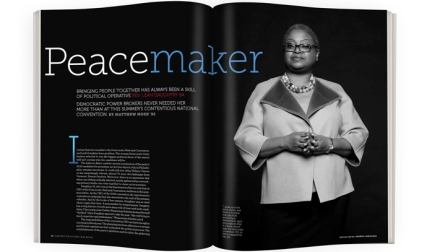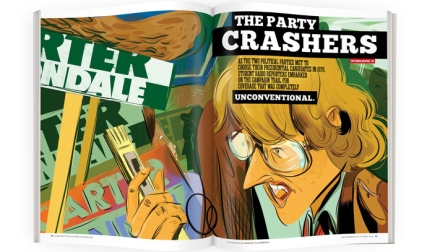What place do theological and confessionally religious texts have in a secular, private liberal arts curriculum? Why would we expose students from all backgrounds and every religious persuasion or none to texts written by religious insiders, texts that make exclusive claims about ultimate reality and call for personal and communal transformation according to a particular vision of the good life?
This longstanding debate continues to crop up in various forms. Should these texts be reserved for parochial schools or seminaries, for an audience already committed to a certain theological perspective? Scholars of religion are understandably wary of the ways heavy-handed confessional attitudes might derail commitment to the academic study of religion, but this important concern has more to do with the environment, parameters, methodologies and goals of teaching and curricular design.
When it comes to the course content itself, there are good reasons to expose students to texts written by religious insiders for their communities. Theology, with its otherworldly claims and calls to commitment, still has a place within the humanities. Not only is theology a key historical progenitor of the liberal arts curriculum, but these discourses also continue to play a role in educating students and preparing them for life in the secular public sphere.
I teach a seminar titled “Religion and Social Capital,” which introduces students to ideas of social capital and network power. We explore these concepts in connection to religious reflection on the sacredness of community and the ethics of relationships. Alongside sociologists and theorists such as Pierre Bourdieu, Robert Putnam, Thorstein Veblen and Marcel Mauss, I include a week dedicated to theological debates about the Trinity and its bearing on forms of Christian community, as reviewed by theologians such as Kathryn Tanner and Miroslav Volf.
When I first constructed the syllabus, the week of reading dedicated to theology stood out to me as a marked shift in texts and tone. We would move from broadly secular conversations about the social world that each student presumably could enter into, to a narrow and rather esoteric debate by Christians about the Trinity and its relation to the lives of committed believers. While I suspected this shift might be jarring, I sensed that it would be a productive juxtaposition, believing the conversation to be deeply relevant to our broader exploration of social capital. Class discussion confirmed my intuitions and underscored the following five benefits of including theology in humanities and social science courses.
Including theology can help foster generous and empathetic reading. Just as historical texts invite students to leap from their current context to other eras, and novels offer new, imagined worlds to inhabit, so theological texts provide windows onto the distinct values of particular communities. Theologians pride themselves on constructing logical and coherent systems (hence the term “systematic theology”), meaning there is an entire thought world that invites habitation and consideration. Crossing these divides creates opportunities for empathy and for generously making room for different viewpoints.
It can be jarring to read a text that clearly doesn’t have you in mind as an audience. Many students commented on this. I was impressed with how they endeavored to get into the minds of the authors and implied readers, struggling to understand the stakes. Why care about the implications of technical terms such as “kenosis” or “perichoresis”? Could these claims about God’s mysterious inner life provide insight on the flows of social capital in our society?
This afforded the chance to develop skills in inhabiting the perspectives of others and considering their logic. One had to suspend judgment and work through disorientation, generously considering a different worldview.
Including theology helps disrupt the myth of academic objectivity. Theology serves as a reminder of the implicit normativity in all disciplines of inquiry. Theology also acts as a space to explore the promises and pitfalls of making prescriptive claims. In considering the direct call by these theologians to pattern their lives after the mutual self-giving of the Father, Son and Spirit, for instance, students were quickly sensitized to the more subtle value claims and visions of all our course texts. Students recalled that, in purporting to be a straightforward and empirical analysis of trends in American society, Putnam’s Bowling Alone set forth a fairly value-laden lament about the decline of social capital. They read Putnam as nostalgic for a bygone age of social cohesion, one subtly based on a singular and narrow set of cultural values he hoped to reclaim.
Theology’s clear use of particular norms and values helped remind students to seek out the more implicit value-laden viewpoints proffered by all our authors.
Including theology provides unique insights into Western culture and society. Familiarizing students with theological ideas helps them be better readers of culture and analysts of our social institutions in the West. At least one lesson from books such as Charles Taylor’s A Secular Age or Michael Gillespie’s The Theological Origins of Modernity is that understanding theology provides glimpses into many of the forces that shaped societies in the West. We gain a historical and genealogical sense of where we’ve come from and why we think and act the way we do.
As students read sociologist James Coleman’s description of the shift from “primordial” to “purposive” social organizations, they were attuned to the critical role that religion played as social cohesion around family and church gave way to new networks and corporations. Having read of the long-held claims about society being patterned in the image of God as Trinity, students were better equipped to evaluate the motives and concepts informing earlier and later institutional arrangements. Tuning in to the theological dimension allowed access to criteria often missed in other forms of social analysis.
Including theology projects alternative possible worlds. Theology is a language of imagination. It preoccupies itself with claims about unseen realities and their supposedly visible effects and worldly consequences. Radical alternatives are something we are currently short on in our public discourse. Part of this is a failure of imagination. Whether or not one finds a particular theological vision compelling, immersing oneself in such texts fosters the capacity to think creatively about new possibilities.
Deeply impressed with sociologist Ronald Burt’s application of the theory of structural holes in organizations, students creatively considered how the incarnation of the Son served to bridge the structural hole between God and humankind. Could we say that God shared divine social capital with humanity in this act, inviting them into the benefits of the Trinitarian community?
Students then collaborated to construct proposals for social action, from government policy to community programs in which ideas of compassion and self-sacrifice advanced by these theologians might be translated into more inclusive visions for improving society.
Including theology invites critical analysis. Even if they’re a vastly different language game, theological texts are still subject to the same criticism applied to other genres. Reading theology need not call for the suspension of judgment. Rather than simply dismissing these texts with “this has nothing to say to me,” students first considered the claims on their own terms, evaluating internal logic and coherence. They then assessed the persuasiveness of the ideas and possibilities of translating the arguments to other audiences. Finally, they analyzed the hidden assumptions and interests informing the texts.
Students recalled Bourdieu’s discussion of the ways spiritual capital in religious communities is often cultivated by ignoring the economic costs and benefits of piety. This enabled a critical reading of the theological call to self-sacrifice in the image of the Trinity. Students asked whose interests were served and what institutional positions benefitted from such visions of humble service.
Considering the Trinity from the vantage point of social capital is a fascinating concept unto itself, but the benefits of including this theological interlude in a liberal arts class exploring social theory were even more far-reaching. Even as theology helped shape humanistic perspectives in the Western university and provided a framework for the liberal arts, its presence continues to help prepare students to analyze and respond to the full scope of human experience in the world today.
Devin Singh is an assistant professor of religion. He was previously a Mellon Postdoctoral Fellow at Yale, where he earned his Ph.D.




